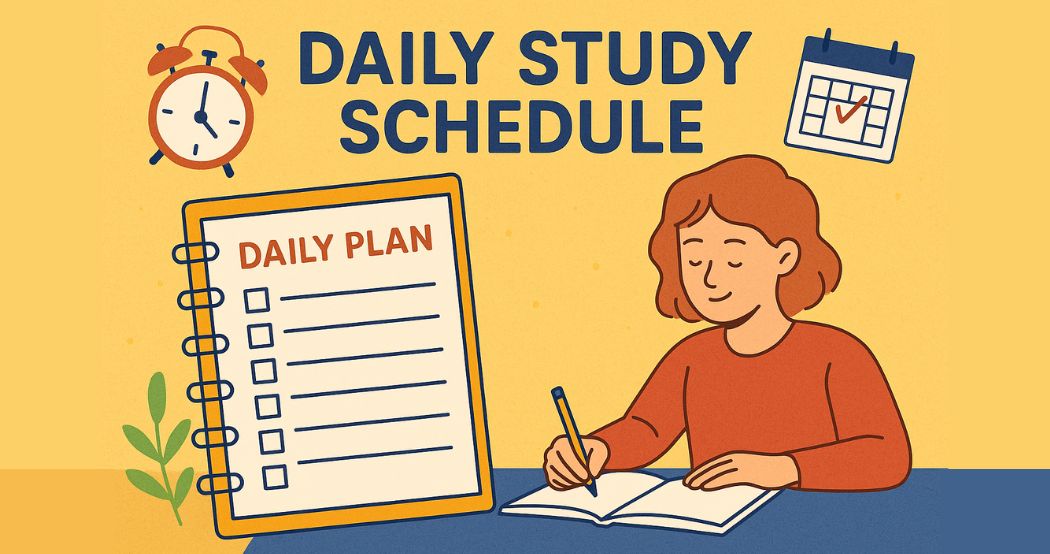Most of the students have multiple approaches on their mind to start the preparation effectively, but when it comes to following it, they face challenges in creating a proper plan. They pick random topics, skip tough chapters, and repeatedly revise easy chapters.
The result?
- Some topics remain incomplete.
- Weak areas never improve.
- Students feel nervous and are not ready for the exam.
Fret not! We've got your back! In this blog, we will guide you step-by-step on how to create an effective study routine for the Olympiad that works. Whether students are in primary school or higher classes, this study plan for the Olympiad exam can be customized to their needs.
Study Plan for the Olympiad Exam
A well-structured study plan is the key to success in any Olympiad exams. By balancing revision, learning new topics, and regular practice, students can boost both speed and accuracy. A good plan includes reviewing concepts, solving mock tests, and revising important formulas daily. Along with the right study materials and consistent practice ensures better focus and performance. With a few discipline and smart preparation steps, cracking the Olympiad becomes much easier.
Daily Study Schedule for Olympiad Exam Preparation
Studying without a proper structure may lead to missed topics and timely revision. Instead of studying randomly, divide the day into three key parts: learning, practice, and revision, which helps complete the syllabus on time and revise properly.
- Morning: Start the day with a quick revision of what I studied yesterday. Then learn a new topic with a fresh mind.
- Afternoon/Evening: Practice questions related to the topic that was learned. Solving problems daily builds speed and accuracy.
- Night: Spend a few minutes revising formulas, key points, or notes before sleeping. This helps in long-term memory.
Students should not ignore their weak topics; they must focus on areas that need improvement, which will create a balanced skill set and significantly enhance overall performance.
Olympiad Preparation Timetable
A smart Olympiad study timetable for students isn’t about studying long hours; it’s about balance. It combines learning, practice, revision, and breaks to effectively build skills. Consistent daily effort and discipline help students stay organized and confident. Over time, small, focused sessions lead to big success on exam day. A well-planned timetable makes preparation efficient, effective, and motivating. Here it is:
|
Block |
Focus Area |
Creative Ideas |
|
Brain Warm-up (15–20 min) |
Puzzles, riddles, memory games |
Fun start; engage the mind |
|
Concept Learning (30–40 min) |
New subject concepts |
Use charts, diagrams, and videos |
|
Practice Problems (30–45 min) |
Apply concepts |
Timed mini-challenges, track scores |
|
Quick Revision (15 min) |
Review key points |
Flashcards, sticky notes |
|
Mock / Test (30–60 min) |
Full/partial tests |
Simulate exam; award stars |
|
Creative Breaks (10–15 min) |
Exercise, doodle, or short story |
Refreshes focus, keeps motivation |
With the right study approach, preparation becomes purposeful. Small daily steps, discipline, and focus turn challenges into confidence and exams into opportunities to shine.
Best Study Routine for the Olympiad at Home
A well-planned timetable will only bring results if students promise to follow it systematically. Maintaining focus, practicing with discipline, and staying consistent with the right schedule to ensure that study goals are met, progress is stable, and preparation for the Olympiad remains on track.
- Use the 50–10 Rule: Study for 50 minutes, then take a 10-minute break to stay fresh.
- Mix Theory and Practice: Don’t just read, spend equal time solving questions.
- Alternate Subjects or Topics: Change subjects after a while to avoid boredom.
- Track Progress: Mark off topics you finish to stay motivated
A carefully designed timetable is just the first step toward Olympiad success. True results come when students follow it with a focused approach.
Study Tips to Crack the Olympiad
Smart preparation starts with an effective study plan, and smart results follow when students apply the right preparation tips.Understanding the exam requirements and preparing accordingly is important to achieve success in the Olympiad. Here are some tried-and-tested study tips to crack the Olympiad:
- Start Early: Begin preparation at least 3–4 months before the exam.
- Solve Higher-Level Questions: Olympiads test your ability to think beyond school textbooks.
- Focus on Speed and Accuracy: Both matter equally in competitive exams.
- Use Quality Resources: Choose good Olympiad books, online practice tests, and video lessons.
- Stay Consistent: Even 2–3 hours of daily focused study are better than last-minute cramming.
Olympiad preparation can be challenging; the journey may test a student’s patience and willpower. But with the right mindset and right strategies can change the challenges of Olympiad preparation into a rewarding path toward knowledge, confidence, and success.









